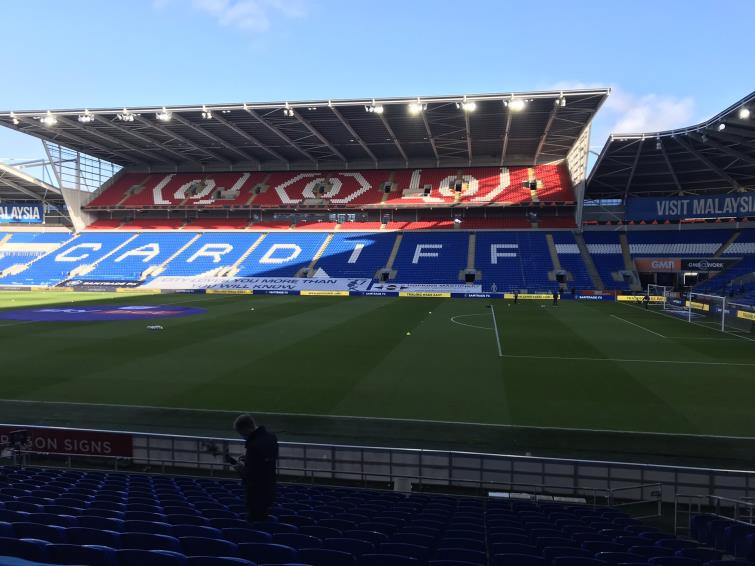'Bloody weird there's no fans like' steward states the obvious in south Wales derby

By Fraser Watson
Over in the nearby park, a young boy played keepy-uppies with his dad.
Roadside, two police officers paraded on horseback with an urgency akin to a couple of toddlers on their first pony ride.
Outside the stadium, a council worker whistled went about his business fixing a sign with the minimum of fuss.
It was South Wales derby day. And yet it felt like anything but.
Upon my arrival, a steward grumbled the blindingly obvious on the gate: “Not like a normal derby this,” he informed, helpfully.
“Bloody weird there’s no fans like.”
Beneath his belligerence however, lay a salient point. Inside the Cardiff City Stadium ahead of the latest Cardiff v Swansea clash was the sight of more than 33,000 empty seats, and an eerie silence that betrayed the magnitude of the occasion.
And yet, such is the conflicting nature of our Covid-19 plagued society at present, a short walk away the hustle and bustle of retail outlets was evident. Lengthy queues, bags full to the brim of Christmas shopping, and a distinct lack of social distancing that would only serve to exacerbate those unable to attend football games on safety grounds.
Indeed, since June the professional game in the UK has harnessed its ability to continue through adversity. Football has a capability to engage fans regardless of the bigger picture outside it, and this has never been more prevalent than recent times. A global pandemic and harrowing death toll can be temporarily rendered academic when your team are conceding sloppy goals at corners.
But football has been forced to plough on with the essence ripped away from it. Games without fans have been strange occasions. The South Wales derby without them, irrespective of Swansea’s polished performance, delved deep into the realms of anti-climactic.
Supporters and former players of both sides tried their best on Twitter. Archived footage, club songs, obscenities, all the standard social media ingredients for a fervent build up were there.
And yet, the vitriolic cauldron that greeted both sides as they walked out at the same venue last January was replaced by surreal silence. No juvenile cheers or boos when player names were read out, no sense of uneasiness as obscenities were screamed, no defiant attempt from the away fans to drown out songs about Swansea slums with reference to swimming away.
A half-baked attempt to ramp up some atmosphere with low volume music over the tannoy had to suffice.
As the steward had already alluded to, bloody weird.
Four minutes in Connor Roberts made a hash of controlling a slow rolling ball in front of the Ninian Stand. No ironic cheers, no ear lashing. Roberts turned, sauntered casually back to halfway, and carried on.
Although perhaps for the hosts, the absence of irate supporters was in part a blessing as they p aid their own respects to social distancing literally in the early stages. They had barely laid a glove on Swansea before Jamal Lowe pounced six minutes in with a less than unstoppable goal.
After 25 minutes, the visitors had enjoyed 70% possession. For Neil Harris, the only potential gripe would have been when Swansea defender Ryan Bennett, already on a booking, was perhaps fortunate to escape another after bringing down Kieffer Moore outside the area.
Indeed, the needle that traditionally accompanies this clash was still there. Five yellow cards had already been shown when 67 minutes in, Cardiff’s Joe Ralls gave referee John Brooks zero choice but to brand him his second one for recklessly lunging into Korey Smith.
Just five minutes later, Lowe settled matters with a far more memorable solo effort.
It capped one of the best Swansea displays of Cooper’s reign, and behind closed doors or not, the emotion evident when the manager, his staff, and players engaged in a group huddle afterwards showed it still mattered deeply.
But it was also an afternoon that reinforced the notion that the buzz, adrenaline, and atmosphere that accompanies football’s hyperbole remains sadly absent. There are now limited numbers permitted in certain regions in England, but in Wales it seemingly remains a distant concept.
One of the most monotonous phrases used by managers ahead of a derby clash, that matters deeply to both players and local communities, is it’s ‘just another game’.
To the naked eye however, that’s all the South Wales derby was.
Bring back the tribalism, bring back the hostility, and if we have to, bring back Oli McBurnie and Sam Rodon exchanging hand gestures with opposition supporters.
Simply put, find a way to bring back some fans into Welsh football stadiums.
After all, it may just be safer than shovelling them into nearby shops.